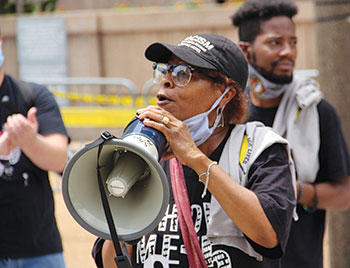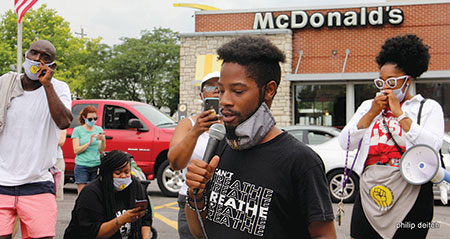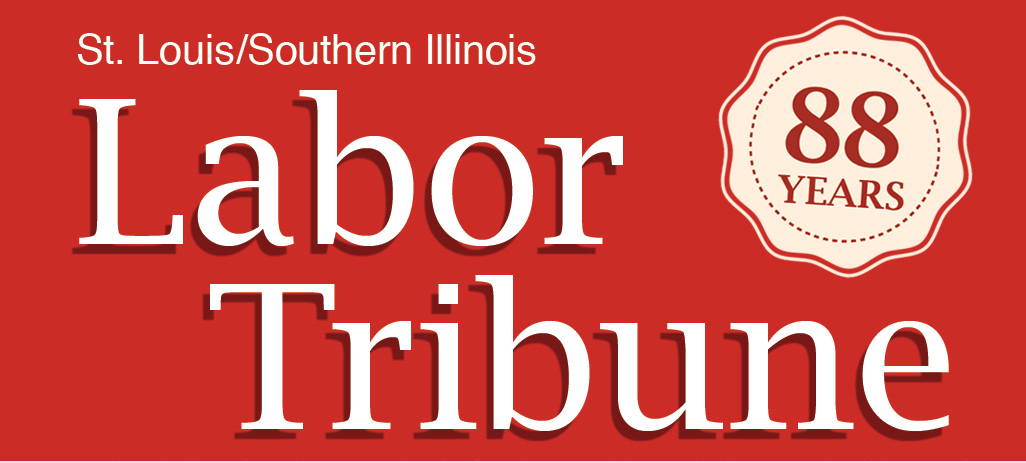Low-wage workers ‘Strike for Black Lives’
Downtown St. Louis – Some 50 fast-food, service industry and gig workers rallied with Organized Labor July 20 at the McDonald’s on Tucker Boulevard in St. Louis to demand $15 an hour for low-wage workers, and an end to systemic racism and economic inequality.
The demonstration was part of nationwide effort that included rallies across the U.S. and around the world.
Tens of thousands of workers in 160 cities walked off the job for strikes inspired by the racial reckoning that followed the deaths of several Black men and women at the hands of police. The protests drew support from people whose jobs in health care, transportation and construction do not allow them to work from home during the coronavirus pandemic.

Betty Douglas, who has worked for McDonald’s for 14 years, said she still makes $10 an hour, which isn’t enough to cover her living expenses.
“McDonald’s is failing Black and Brown workers,” Douglas said. “With a billion-dollar company, that ain’t right. That’s why we’re here fighting. We need unions. They work us like slaves in the heat.”
Douglas, like many of the protesters at the demonstration, have been involved for years in the “Fight for $15” movement, a call to increase the federal minimum wage to $15 an hour.
MINIMUM WAGE
The federal minimum wage of $7.25 an hour hasn’t increased since 2009.
In Missouri, voters overwhelmingly approved 2018’s Proposition B to increase Missouri’s minimum wage. As a result, Missouri workers saw the minimum wage increase by 85 cents to $9.45 an hour beginning Jan. 1, 2020. It is set to increase slightly each year until it reaches $12 in 2023.
POLITICAL SUPPORT
Missouri state Rep. Rasheen Aldridge, a Democrat representing eastern St. Louis, and Rep. Doug Clemens, a Democrat representing part of north St. Louis County, also attended the event.

“Before I was a state representative, I was a low-wage worker for Jimmy John’s,” Aldridge told the crowd. “You cannot talk about economic justice without talking about racial justice. A lot of low-wage workers are workers of color. After work, they go into neighborhoods like Carr Square, like Walnut Park, (which) are over-policed. So not only does McDonald’s say their life doesn’t matter by not paying a fair wage, they go into a neighborhood where the police say their life doesn’t matter.”
The group marched down Tucker Boulevard chanting “We work, we sweat, put $15 on our check,” and “Hold them burgers, hold them fries, make my wages supersize.” More protesters followed the procession in cars with their flashers on, honking along with the chanting.
RALLIES ACROSS THE U.S.
The “Strike for Black Lives” was organized or supported by more than 60 labor unions and social and racial justice organizations, including Jobs with Justice, and included a range of events in more than two dozen cities.
“What an incredible, incredibly powerful day of action we had,” said Stanley Jackson, community coordinator for the Fight for $15. “We were able to pull off walkouts, strikes, rallies, art builds, online town halls, and eight-minute-46 second solidarity actions,” (marking the length of time a Black man, George Floyd, lay on the ground with a police officer’s knee on his neck while pleading that he couldn’t break.) Floyd’s death ignited nationwide and global demonstrations against police brutality and systemic racism.




Leave a Reply